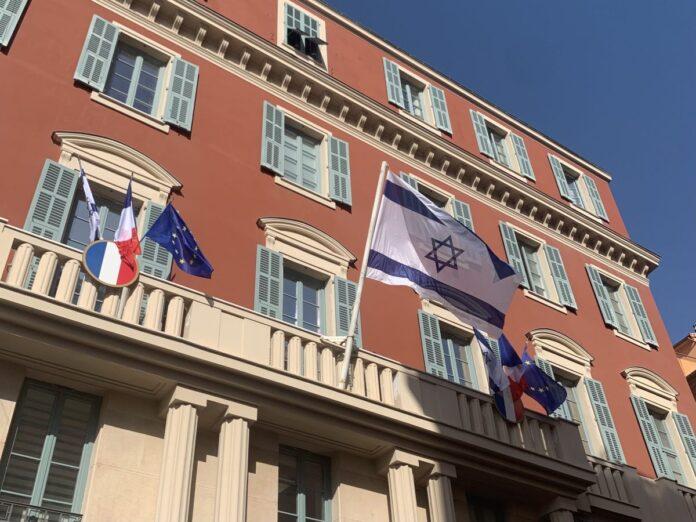In a significant legal ruling that has stirred debate in both local and international communities, a French court has ordered the mayor of Nice to remove Israeli flags that have been displayed outside the city hall. The decision, prompted by concerns over political neutrality and the potential implications of such symbols in a multicultural society, has sparked discussions about the intersection of civic expression and governmental decorum. This development comes amid ongoing tensions surrounding the Israel-Palestine conflict, raising questions about the role of municipal leaders in navigating political statements. As reactions pour in from various stakeholders, including community members and political analysts, the case illuminates broader issues regarding national identity, diplomacy, and the responsibilities of elected officials in sensitive global matters.
French Court Ruling Sparks Debate on Political Symbols in Public Spaces
The recent decision by a French court to mandate the removal of Israeli flags from the city hall in Nice has ignited a fierce debate regarding the display of political symbols in public spaces. Critics argue that such rulings could undermine freedom of expression and the symbolic representation of solidarity within diverse communities. Proponents of the court’s decision contend that the city hall, as a government building, should remain neutral and free from political symbols that may alienate certain groups of citizens. This ruling raises important questions about how municipalities balance political statements with inclusivity.
Various stakeholders have voiced their opinions on the matter, leading to a divided public response. Key points of contention include:
- Freedom vs. Neutrality: Should public buildings avoid displaying political symbols?
- Community Identity: Are symbols of support for foreign nations detrimental to local civic unity?
- Local Legislation: How should local governments navigate internationally sensitive topics?
This ruling has the potential to set precedents for future cases, illustrating the complex interplay between local governance and international political sentiments. The public continues to engage in a dialogue around the broader implications of such judicial decisions, highlighting the need for ongoing discourse in a globally interconnected world.
Analysis of the Implications for Local Governance and National Identity
The recent ruling by a French court, mandating the removal of Israeli flags from the city hall in Nice, underscores a growing tension in the interplay between local governance and national identity. This decision raises significant questions about the role of municipal authorities in navigating international symbols and sentiments while adhering to national and European legislation. It highlights how local leaders, like the mayor of Nice, must balance community expression with broader legal frameworks that seek to maintain neutrality in matters of international conflict, thereby influencing public sentiment and identity within the region.
Additionally, the implications extend beyond mere flag representation, as it poses a challenge to the communal sense of belonging and acceptance in a multicultural France. The decision can foster divergent responses, leading to potential divisions within local populations. Local governance becomes a delicate balancing act, focusing on:
- Cultural Sensitivity: Addressing the needs and feelings of diverse community groups.
- Legal Compliance: Aligning local initiatives with national laws and EU regulations.
- National Cohesion: Fostering unity in a nation marked by varied historical ties and identities.
Responses from the Nice Mayor and Community Reactions to the Decision
In the wake of the court’s ruling, the Mayor of Nice, Christian Estrosi, expressed his disappointment, asserting that the Israeli flags flying outside City Hall were a symbol of solidarity with victims of terrorism. In a statement released to the press, Estrosi emphasized the importance of standing with those who suffer from violence, stating, “Our position is clear: we will continue to defend human rights and the right to exist.” Many residents echoed his sentiments, reflecting a community deeply engaged in matters of international significance and the ongoing conflict in the region.
Community reactions, however, were mixed. Supporters of the mayor celebrated the presence of the flags as a powerful gesture of support, while opponents viewed it as a political statement that undermined France’s secular principles. A recent survey conducted by local media outlets revealed that:
| Opinion | Percentage |
|---|---|
| Supports the flags | 42% |
| Opposes the flags | 36% |
| Undecided | 22% |
Amidst this backdrop, some local organizations plan to host discussions to foster dialogue on the implications of such symbols within civic spaces, emphasizing the need for understanding and cohesion in a city marked by diversity.
Recommendations for Balancing Free Expression and Municipal Regulations
Striking a balance between the right to free expression and municipal regulations is essential in fostering a harmonious community. Local authorities should consider the following strategies to ensure that freedom of speech is upheld while respecting the need for civic order:
- Community Consultation: Engage with residents to discuss the implications of public displays and gauge sentiments, fostering mutual understanding.
- Clear Guidelines: Develop transparent policies that define what is acceptable and what is not, providing a framework for expression that aligns with community values.
- Conflict Resolution Mechanisms: Establish channels for addressing disputes that may arise from public displays, ensuring concerns are heard and addressed amicably.
Moreover, municipalities must navigate the sensitive intersection of cultural symbols and potential political statements. Adopting a proactive stance can aid in minimizing conflicts. Key recommendations include:
- Contextual Awareness: Understand the historical and cultural significance of symbols to avoid misinterpretation or insensitivity.
- Third-Party Mediation: Involve community organizations to mediate potential conflicts arising from differing viewpoints on displayed symbols.
- Educational Initiatives: Promote programs that educate the public on the implications of various expressions, fostering awareness and dialog.
The Way Forward
In summary, the French court’s decision to mandate the removal of Israeli flags from the city hall in Nice marks a significant development in the ongoing discourse around symbols of international relations and local governance. This ruling has sparked varied reactions, reflecting deep-seated sentiments on both sides of the Israeli-Palestinian conflict. As Nice’s mayor navigates the implications of this verdict, cities across France may find themselves facing similar dilemmas. This case underscores the complex intersection of local authority, national law, and international politics, inviting further examination and debate in the public sphere. As the situation evolves, the broader ramifications for French municipalities and their approaches to international symbols remain to be seen.




